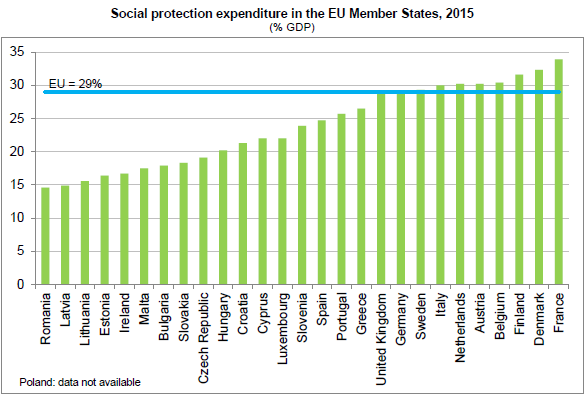Yann Algan, Sergei Guriev, Elias Papaioannou, Evgenia Passari, (2017), “The European trust crisis and the rise of populism”,VoxEu, 12 December A wave of populism has been gaining ground in the West since 2012. This column uses regional data for 26 European countries to explore how the impact of the Great Recession on labour markets has affected populist voting, political attitudes, and trust. The results indicate a strong link between unemployment …Read More
Beware return of eurozone’s north-south blame game
Pierre Briançon, (2017), “Beware return of eurozone’s north-south blame game”, Politico, 13 December Plans for grand eurozone reforms threaten to revive one of the most poisonous debates of the euro crisis, which nearly destroyed the monetary union.It’s been framed at times in terms of geography (the south of the Continent versus the north), in terms of morals (“virtuous” governments versus “sinners”), or in terms of pure politics (free-market conservatives versus …Read More
A fresh approach to complete the banking union in the Eurozone
Stefani Micossi, (2017), “A fresh approach to complete the banking union in the Eurozone”, VoxEU, 11 December Negotiations on the banking union in the Eurozone have been stuck ever since the Italian government assembled a blocking minority opposing further discussions on proposals to reduce legacy risks in banks’ balance sheets. This column argues that completing the banking union should once again be given priority, and that the European deposit insurance …Read More
A Tale of What Could Have Been for the EU’s Poorest Country
Elizabeth Konstantinova, Slav Okov, (2017), “A Tale of What Could Have Been for the EU’s Poorest Country”, Bloomberg Politics, 11 December A decade ago, Bulgarians flooded the streets in celebration of their ex-communist nation joining the European Union. There was a light show in the skies above the capital. Then-Prime Minister Sergei Stanishev called it a “dream come true.” The euphoria wasn’t just about shaking off the country’s Eastern Bloc …Read More
Pensions reforms have slowed in OECD countries but need to continue
OECD, (2017), “Pensions reforms have slowed in OECD countries but need to continue”, 5 December Further reforms are needed across OECD countries to mitigate the impact of population ageing, increasing inequality among the elderly and the changing nature of work, according to a new OECD report. Pensions at a Glance 2017 says that public spending on pensions for the OECD as a whole has risen by about 1.5% of GDP …Read More
Sovereign Concentration Charges are the Key to Completing Europe’s Banking Union
Nicolas Veron, (2017), “Sovereign Concentration Charges are the Key to Completing Europe’s Banking Union”, Bruegel, 7 December The past crisis revealed that most euro-area banks have disproportionate sovereign exposure in their home country. Charging banks for sovereign concentration is one solution to this issue, and would help advance the discussion on banking union. Relevant Posts Daniel Gros, (2017), «Banks as buyers of last resort for government bonds», VoxEU, 27 November …Read More
How the Populist Right Is Redrawing the Map of Europe
Andre Tartar, (2017), “How the Populist Right Is Redrawing the Map of Europe”, Bloomberg, 11 December If 2017 looked like the year when moderate politicians took back Europe, look again. The election of centrist French President Emmanuel Macron and the reelection of German Chancellor Angela Merkel mask a rising tide of anti-immigrant and populist sentiment that is sweeping aside or weakening mainstream party politics across the continent. Relevant Posts Slawomir …Read More
Completing EMU And Protecting Public Investment
Andrej Stuchlik, (2017), “Completing EMU And Protecting Public Investment”, Social Europe, 6 December For many today, debating institutional adjustments to the European Monetary Union embodies typical Brussels solipsism. If it ain’t broke, don’t fix it seems to be a reasonable point of departure, especially with economic growth slowly but steadily returning to Europe, mainly driven by private consumption. However, it is still broken when it comes to sufficiently high levels …Read More
Almost one-third of EU GDP spent on social protection
Eurostat/Almost one-third of EU GDP spent on social protection/8 December 2017 Since 2010, social protection expenditure in the European Union (EU) has increased slightly, from 28.6% of GDP in 2010 to 29.0% in 2015, according to data from Eurostat, the statistical office of the European Union. In 2015, the two main sources of funding of social protection at EU level were social contributions, making up 54% of total receipts, and …Read More
A European Monetary Fund: Why and how?
Daniel Gros, Thomas Mayer, (2017), “A European Monetary Fund: Why and how?”, CEPS Working Paper, 11 December We argued as early as 2010, at the outset of the sovereign debt crisis, that Europe needs a European Monetary Fund (EMF). In the meantime, the European Stability Mechanism (ESM) has been created, which performs the function of an EMF. It was critical in containing the cost of the crisis and four of its five country programmes …Read More





